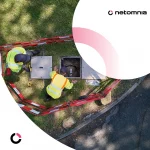Challenge for UK ISPs as Ofcom Forces Emergency Video Relay Service UPDATE

Ofcom has today opened a further consultation on their plan to force all communications providers – seemingly including broadband ISPs that may not even provide phone services – to offer a “free” 24/7 emergency video relay service in order to help users of British Sign Language (BSL) to talk with the emergency services.
The changes, which were understandably designed to ensure that disabled people (particularly deaf users) can access the communications services they need in an emergency (i.e. the principle that disabled people should have equivalent access to emergency communications), were first proposed back in 2019 and they’ve since been developed through an earlier consultation.
Systems like this work by making it possible for deaf users to make a video call, via a connected device, to an interpreter in a call centre. The interpreter translates what the deaf user is signing into spoken English for the emergency services to hear, and signs what the emergency services are saying to the deaf end-user.
Advertisement
On the whole, this sort of system is something that should be welcomed, although there’s no getting around the fact that it also represents a huge change for some providers, particularly smaller broadband ISPs and those that don’t currently provide phone services. Despite this Ofcom states that their original consultation “received broad support“, but some issues were highlighted (not least around the issue of cost) and so the regulator is now conducting a second consultation.
Ofcom’s Consultation Statement (PDF)
We are proposing additions to the rules providers must follow (our General Conditions) on which we consulted in our initial consultation. These relate to:
• an obligation on relevant communications providers to provide an emergency video relay service themselves or contract with a relay supplier or wholesaler to provide it on their behalf; and
• an obligation for data used for emergency video relay to be zero-rated to the greatest extent that is technically feasible.These additions are designed to do two things:
• make sure emergency video relay is properly funded; and
• clarify that use of the service must be completely free for deaf users.We have also made some minor revisions to the proposed General Condition text for the purposes of clarity. The revised wording of the proposed General Condition is set out at Annex A5.
We are also proposing additions to the draft approval criteria for emergency video relay. These are designed to ensure that the service is provided at the wholesale level to communications providers on fair, reasonable and non-discriminatory terms. We also propose that deaf users should not be required to register to use the service.
The extra cost and complexity of needing to implement something like this, particularly on smaller networks, is likely to cause a few headaches for some ISPs. Furthermore, there’s an on-going debate about whether or not it’s even fair to force it upon those broadband provider’s (e.g. alternative networks) that do not currently offer home phone services (data only), although it may now be too late to change the outcome.
However, most providers do seem to be giving their support to the adoption of a wholesale model as the “most effective way of meeting the emergency video relay obligation” (particularly in terms of cost recovery). BT is understood to have indicated that it was willing to consider becoming a wholesaler of such services, but they want to hear the views of the rest of the sector first.
Ofcom are inviting responses to this consultation by 30th March 2021 and they then aim to publish a final statement by the end of June 2021. As ever the service might be promoted as “free” to end-users, but inevitably anything that carries an additional cost for the ISP will always work its way into the price you pay. Something like this seems likely to take a long time to fully implement across the industry.
Advertisement
UPDATE 17th Feb 2021
We did query Ofcom’s position on non-phone providers and received the following response.
A Spokesperson for Ofcom told ISPreview.co.uk:
“Our proposals would require communications providers to give deaf users free access to video relay services for emergency calls. As we proposed in our previous consultation, this includes broadband providers who may not currently offer a standard call service, as the deaf user could need to use their network to connect to the emergency services – particularly when using wifi in public places.
The cost of this to companies would depend on whether they choose to deliver the service themselves or contract another organisation to do so on their behalf. The exact cost would then be determined as part of the agreement between the communications provider and the wholesaler, but our proposals mean this may only be a nominal fee for the provider.”
The comment’s example of public WiFi may confuse some people, but just to be clear that this doesn’t mean to say those running a free public WiFi hotspot would need to implement the same service. Instead that requirement would fall on the broadband provider that supplies the internet connection being used by the WiFi hotspot, not the hotspot or outlet (shop, hotel etc.) itself.
Mark is a professional technology writer, IT consultant and computer engineer from Dorset (England), he also founded ISPreview in 1999 and enjoys analysing the latest telecoms and broadband developments. Find me on X (Twitter), Mastodon, Facebook, BlueSky, Threads.net and Linkedin.
« Sky UK Unveils Annual Broadband, Phone and TV Price Hikes
ASA UK Ban Sky Broadband TV Ad After BT Complaint on Pricing »






















































This a great but what about deaf people who don’t use sign language? Hearing loss affects many people later in life. Not everyone can just learn a completely new language at age 70.
In that case they could register to text to 999
https://firstaidtrainingcooperative.co.uk/can-i-text-999/
The service would be for anyone unable to use a voice based system in an Emergency.
Whilst there is the official British Sign Language many find the simpler Makaton easier. If not sign language then there are text cards or optional keyboard. But it could also be used by others both old and young.
The important issue is that it can connect immediately to an appropriate operator and is resilient (UPS for Modem/ONT, Router and device).
In hardware terms it would be no more than an AMAZON Show with a touch/keyboard interface. A combined fixed and 4G device would be better and ideally integrated to smoke/fire/fall/security alarms, door bell etc. For emergencies contact data, address etc could be stored in the device visible to the Emergency operator. ISPs could take a wider view to home automation opportunities.
My view is we should take this seriously. In the UK there are over 12 million adults with hearing loss greater than 25 dBHL (1 in 5 adults) with 10% of these with a hearing loss greater than 65 dBHL. There are at least 50,000 children who are deaf in the UK.
In addition it could also become a more universal emergency facility as we continue to lose the fixed location telephone.
Im a tad confused here, why is this being put onto the isp’s when mobile’s have had the ability to video call for quite some time? Surely they should be taking the lead here.
What happens when the emergency is out and about and they dont have access to wifi?
I don’t get that either. ISPs are not phone providers (unless they choose to be), and are not obliged to provide emergency voice call service to non-deaf users, so why are they being targeted with this new obligation towards deaf users?
I’m all in favour of ensuring that disabled people are treated fairly and have equal access to services (especially emergency services), but this proposal goes way beyond mere equality and imposes an obligation for ISPs to provide a completely new service *only* for deaf people that does not correspond to any existing service they are offering to their other customers.
If the objective is to make the emergency services more accessible, why don’t we modernise those services themselves, allowing people to use email, SMS, WhatsApp video call (perhaps to a sign language interpreter in the despatch center itself) or whatever else they have available?
Why not use a keyboard? Seems a bit cumbersome to sign over video to someone who interprets and then to the other party…. and back again.
Have to agree with this, I imagine it would more simple since ISPs such as Sky and Virgin both have a livechat option surely it would be quicker/easier to identify a customer who is deaf and looking to discuss either their billing, package, disconnection or anything else by ensuring accounts are marked properly for disabilities and when a chat is started online it goes through a check and if it identifies them as vulnerable it starts a chat with the department they wish to speak to regardless of wait times so that it can’t be abused by people looking to get a head, or a dedicated team for those customers?
For a lot of deaf bsl users, English isn’t their first language and sign language is. Being a sign language interpreter, it’s quicker and less stressful for the deaf person to communicate in their first language at the same page you would converse than having to take in a turn by turn text chat that they might not be able to understand.
A great idea, its a shame that mobile equipment manufacturers, like Apple, Google, haven’t designed a software which convert sign language into text yet.
I’m visually impaired and dyslexic and I use Dictation a lot it’s not perfect and funny at times. But it is their.
And it’s a shame that Ofcom doesn’t do anything about the TV companies. There is a shocking lack of sign language and audio description on the catch up services..
If they Brocas audio description and sign language why can’t we have access to it when we like?
And concast who owns Sky are forced to have text to speech software in their program guides on their boxes and audio description a standard on the on demand services in America come on Ofcom!
There has probably been plenty of meetings let’s have some action. It’s pretty obvious what the visually impaired and deaf Community would like to see..
I guess it would be possible for ISP’s, large and small, to set up a number of emergency call centres who would be paid for by a fee to those ISPs. These call centres would have the Artificial Intelligence screen reading capability (as hinted in the article) and forwarding to an operator in case that the signing couldn’t be read.
Alternatively, I would have thought that local authorities with care responsibilities who already use an emergency call service – audio only at present – which is paid for by a subscription to the council (not Council tax) could have the service extended to include video. Such an arrangement ought to relive ISPs of managing emergency services, especially as the POTS connectivity is due to be replaced by IP based connectivity.
The deaf person would need appropriate video equipment to make this work … a tablet computer, mobile phone, etc. and a data connection to carry the signal.
So what would this need, all internet routers to have a wifi signal that only routes to emergency services so if you have WiFi the person next door can contact emergency services over you connection … no big deal.
I know people who have been signing online for years. the tech is there. What ofcom should concentrate on is getting good internet to people so they can make use of it. There are countless orgs who can help people to use it if they can’t manage, eg age uk age concern etc.and there’s always friends, relatives and carers as well.
Just because people may be hearing impaired does not mean they are stupid.
It amazes me that Ofcom can get involved in this sort of case but does nothing about the terrible customer service that companies like Three, Vodafone and others are not providing at vast expense. One only need look on Facebook or other social media where hundreds of cases of terrible service are reported on a daily basis.
Perhaps Boris and his team should force Offcom to take up individual cases. Bet they would have to increase their staff by 1000%.